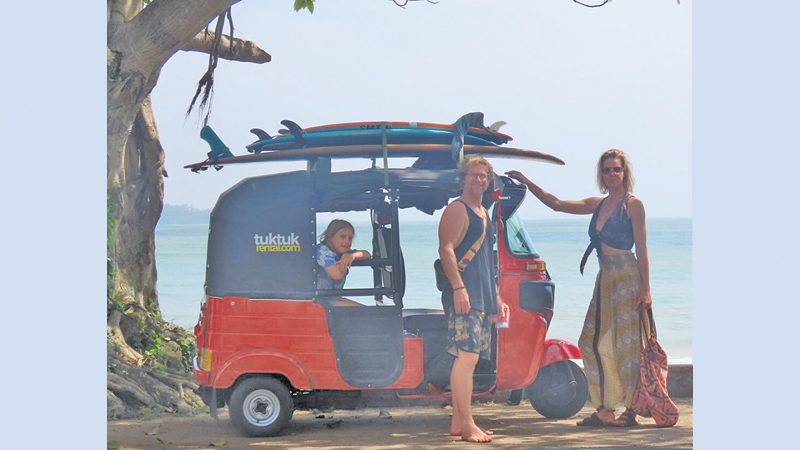I had pictured what my journey from the highlands of Ella to the Unesco city of Kandy would look like, but this was even better. The looping mountain roads stretched out before me as I drove through palm tree-lined valleys and past reservoirs so blue they looked as if they’d been photoshopped.
Purple-faced langurs with their bushy white beards sat on the roadside and looked inquisitively at me, while elephants occasionally sauntered into the street. This was a road trip that couldn’t be hurried.
While I could have zipped along in a hire car, I knew this journey would be far more fun trundling along in a self-drive tuk-tuk. For the last 50 years, tuk-tuks or “three wheelers” have become a typical sight in Sri Lanka. Motorised versions were imported into the country by the Indian Bajaj Auto Company in the late 1970s, and by the ‘90s they were ubiquitous. Now there are one million of them putt-putting along Sri Lanka’s highways.
Holidaymakers fell for the fearless vehicles too, but while they could catch a ride in the hardworking three wheelers, they were only allowed as passengers. Then in 2016, with the launch of Katunayake-based start-up TukTuk Rental, tourists were given the keys to an adventure they would never forget. You can now hire and drive a vehicle, choose your own route through the highlands or along the palm-fringed beaches and stop for a cup of milk tea when the mood takes you.
But what makes this experience extra special is that this business, which marries social good with financial goals, leases its tuk-tuks from locals. Since it started, around Rs300,000,000 (US$1m) has gone into the pockets of 1,000 families in Sri Lanka.
TukTuk Rental was the brain child of Thomas Cornish, an Australian civil engineer who was working for a non-profit in India. On the second day of a cycling holiday there, Cornish crashed his bike. A local offered up an old tuk-tuk so that he could complete the journey.
Cornish found the ride so enjoyable, he wanted other travellers to have the same experience. Since the distances between Indian cities can be challenging, he and his cofounders Richard McKeon and Wietse Sennema looked for another country where tuk-tuks were popular. Finally, they decided to launch TukTuk Rental in Sri Lanka.
Sennema, who grew up on the island, was aware that tuk-tuk driving was a second source of income for many people. “They’ll have a daytime job, then in the evenings they drive the tuk-tuk,” he said. The trio started knocking on doors to see if the tuk-tuk owners would rent their three-wheeler to holidaymakers and earn an income while they stayed at home with their families.
Shalitha Sankalpa from Mount Lavinia was one such owner. He worked at a hotel during the day then would drive his tuk-tuk for up to six hours in the evening. “I would earn 200 rupees a day on average,” says Sankalpa. He heard about the new startup and, in 2017, decided to offer his family tuk-tuk as one of their initial 10 vehicles. Within a month, his earnings had doubled.
The social business has continued to give him dream moments, including when South African cricketer Jonty Rhodes hired Sankalpa’s tuk-tuk to drive along the coast to Ahangama. “It was a super special day for me,” says Sankalpa.
Letting tourists loose on the roads was fraught with potential problems, but with the help of the Automobile Association of Ceylon, TukTuk Rental was able to make sure that holidaymakers were legally covered by providing them with a Sri Lankan driving licence. The team also hired driving instructors to give each tourist a lesson before they took to the road, and employed mechanics to maintain the vehicles.
After I finished my journey and handed over the keys, I watched the tuk-tuk reassuringly wobble off along the road to begin its return journey to the highlands. I had no doubt it would get there. This plucky vehicle seemed representative of a country that even when faced with the toughest of journeys still remains strong.
(BBC)







